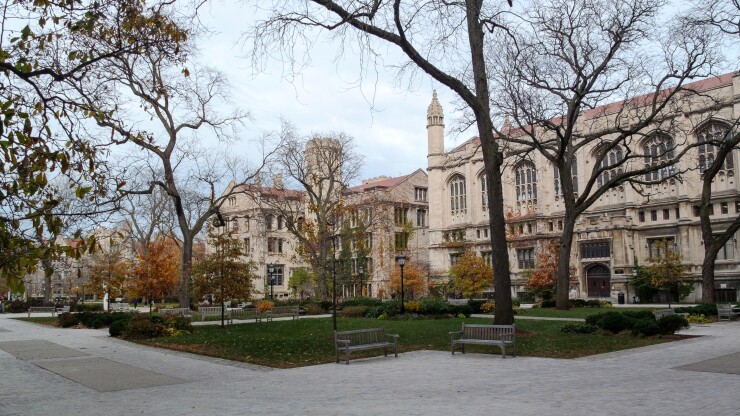As students head back to campus, the University of Chicago will hit the market this week with rating headwinds due to the COVID-19 pandemic’s fiscal threats.
JPMorgan is running the books on the $300 million taxable deal expected to sell Wednesday. Citi and Loop Capital Markets are co-seniors. Proceeds will fund various corporate purposes, including new projects and the refunding of outstanding debt.
The bonds carry a AA-plus from Fitch Ratings, Aa2 from Moody’s Investors Service, and an AA-minus from S&P Global Ratings. Ahead of the sale, Fitch and Moody’s moved their outlook to negative from stable while S&P kept its outlook at stable. The university has about $3.7 billion of debt.

The university benefits from its global prominence and elite status, exceptional demand, selective admission, and strong fundraising and research grant funding levels with sufficient flexibility to manage operating costs and near-term capital needs despite its high debt load, the rating agencies say.
But after having made some gains toward fiscal balance, the pandemic’s near-term impact on fall revenues could pressure operating performance and hurt its fiscal flexibility with liquidity needs potentially exacerbating an already high debt load, Fitch said.
The negative outlook “reflects the additional risk of prolonged coronavirus impacts into spring 2021, including reversion to fully remote course delivery, and the resultant impact on student fee revenues and research activity, as well as increased reliance on endowment draws and/or bank lines of credit to provide operational support,” Fitch said.
The university has estimated the gap for fiscal 2020 due to the pandemic’s impact on operations at between $205 million and $235 million after measures taken to limit losses and ongoing pressures in fiscal 2021 will delay a planned return to balanced operations.
For fiscal 2021, the university budgeted for an operating loss of $150 million including lost tuition and fees and reduced occupancy rates and room and board hits. “The actual fiscal 2021 operating results may vary from budget depending on the duration and characteristics of the pandemic,” the school reports in an investor presentation.
“The revision of the outlook to negative reflects heightened pressure on the University of Chicago's operations at a time when financial leverage is already elevated and will be increasing with the proposed issue,” Moody’s said.
Some one-time measures will ease, but not fully counter, possible impacts, including the receipt of $6.2 million through the federal CARES Act relief package signed March 27. The school is distributing the funds as grants to students. The school has slowed hiring, made other cuts, and is adjusting its capital spending.
The university moved to remote, virtual instruction, like most in the higher education sector, last spring and for the fall semester will use a hybrid model with some students returning to campus. Residence halls will operate at reduced capacity and restrictions are in place based on local, state, and federal guidance, along with help from University of Chicago Medicine.
Prolonged operating deficits beyond fiscal 2021 and a reliance on extraordinary endowment draws beyond fiscal 2021 could drive a downgrade, Fitch said. The university operated on $2.5 billion of revenues in fiscal 2019. In addition to earnings, revenues rely in part on draws from its $7.2 billion endowment including special payouts to fund strategic initiatives. The fiscal 2019 total payout percentage was 6.6%.
The university enjoys a strong fundraising record, having raising $5.4 billion in a multi-year capital campaign that ended last year. Philanthropy has been impacted by the pandemic, but the university intends to amplify efforts in the coming years. The negative outlook “incorporates potential contractions in fundraising and research funding that are key drivers of the university's strategic positioning,” Moody’s said.
S&P analyst Jessica Goldman said the AA-minus rating and stable outlook “reflects our assessment of the university's extremely strong enterprise profile, which is supported by exceptional student demand and quality metrics, and impressive market position and fundraising.”
The university founded in 1890 is located on Chicago’s south side in the Hyde Park neighborhood and had an undergraduate enrollment of about 17,000 last fall and graduate enrollment of about 10,000. The university also operates the Argonne National Laboratory and Fermi National Accelerator Laboratory in Illinois and is the sole corporate member of the Marine Biological Laboratory in Massachusetts and the University of Chicago Medical Center, a separate not-for-profit corporation.
The original version of the story was updated with the sale amount.





